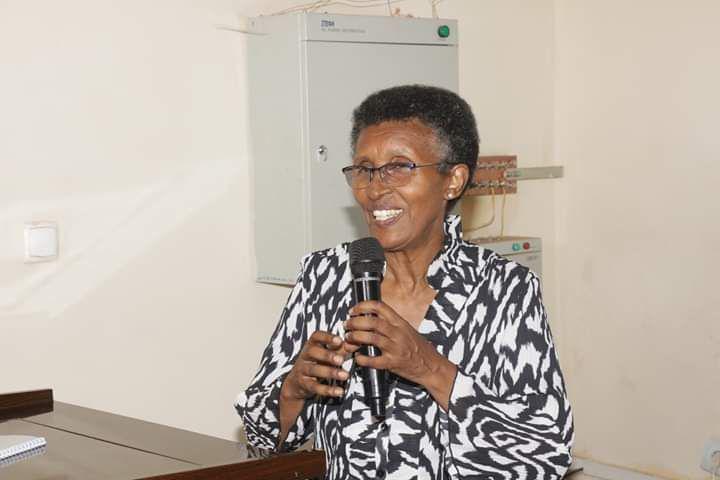December 6, 2019: Prof. Kuwee Kumsa, a seasoned Oromo scholar, human rights and women’s rights advocate and Professor of Social work at Wilfrid Laurier University in Canada delivers an interactive seminar on Women Empowerment at Jimma University. The seminar was organized by the Institute of Oromo Studies (IOS) and attended by JU staff members.
The seminar began with the welcoming address of Dr. Jemal Abafita, President of Jimma University. In his address, Dr. Jemal appreciated Prof. Kuwee’s willingness and commitment to sharing her rich experiences and insights to the participants on the daring issue of women’s empowerment which needs an urgent and systemic deliberation. He expressed that Jimma University is committed to advancing Oromo scholarship, and presented that the very establishment of the Institute of Oromo Studies (IOS) is to serve as the hub through conducting research, and creating such platforms at which indigenous wisdom and scholarly works are deliberated.
In her presentation at the seminar Professor Kuwee shared her lived experiences, scholarly endeavors and insights on the challenges and opportunities of women empowerment. She outlined contextual enablers, the rise in the consciousness of gender oppression and the attention currently paid to the study of indigenous knowledge as some of the opportunities to deal with women empowerment. The persistence of gender inequality, the discrepancy between professed gender equality and practices of gender oppression, on the other hand, are among the challenges outlined in her presentation. Professor Kuwee’s interactive seminar followed an engaging and participatory approach in which knowledge exchange among the participants made an active involvement. Her discussions and arguments at the seminar were rooted in the indigenous wisdom that the transformative agenda of gender equality is suggested to follow the three Siinqee principles of Safuu relationality, tumsaa (solidarity) and Wallaala (the impossibility of self-knowledge). Prof. Kuwee also reflected on the seminar that transnational transformative indigenous knowledge exchanges on gender empowerment engaging the youth (the transformative force) and following the arts-based methodology could bring the gender equality aspired. Hence, the project of women empowerment needs going back to the roots, tapping into transnational indigenous women’s knowledge, following the transformational arts-based approach and focusing the transformative force to address gender equality in a sustainable way.
Following her presentation, the participants shared views, experiences and made an interactive discussion addressing various perspectives on gender empowerment, indigenous knowledge and the various theoretical standpoints pertaining to the matter. The seminar was concluded with Dr. Tsige Ketema’s, JU’s V/president for Research and Community Service closing remark in which she thanked Professor Kuwee for sharing her impressive lived experiences and the participants for the immersive engagement. Dr. Tsige reflected that the University will push forward with the issue of women empowerment through creating an institutional base through establishing Siinqee center under the Institute of Oromo Studies.
Further deliberation on the issue of engaging in a transnational transformative project continued with a team of participants who discussed on the what, where, how, who and why of the project.
Professor Kuwee also had a separate discussion time with Dr. Jemal Abafita on the issue of partnership establishment.



